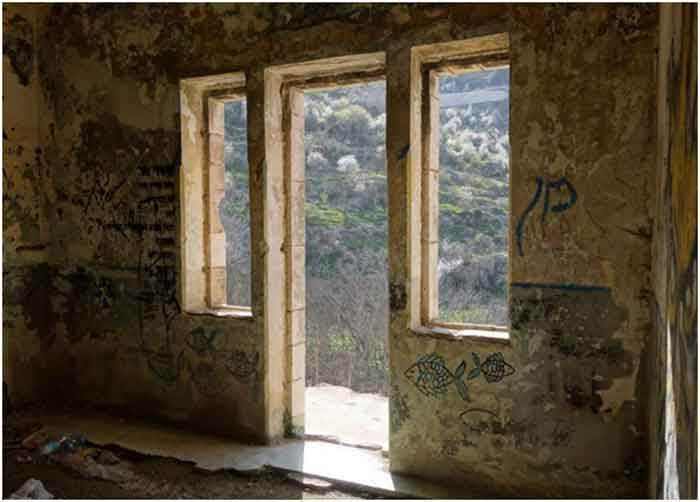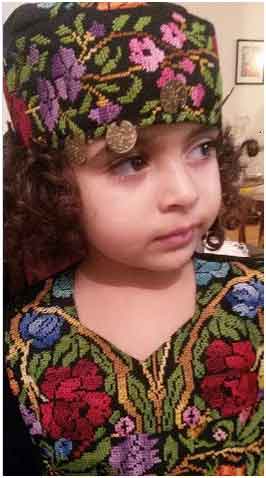Don’t Cry For Lifta: Palestinians Will Endure – There will never be a movie made titled “The Last of the Palestinians!”

“The Jerusalem landscape seen through the ruins of a house at Lifta, 2017” — World Monuments Fund
The last thing Palestinians need is to come to terms in sorrow with our dispossession at the hands of the apartheid, settler-colonial Jewish state. The last thing we need is to be resigned to “facts on the ground.”
The most recent piece in Haaretz (this one by Gideon Levy and Alex Levak) on the violently depopulated Palestinian village of Lifta laments the impending demise of the ruins of what remains of the ancient Palestinian village and, by extension, all of Palestine. It reads like an elegy. The focus is on loss, sorrow and grief when what we Palestinians urgently need now is a focus on hope, revolution and resistance.
Haaretz’ headline reads: “The Saddest Village in Israel —
Plans to build more than 250 luxury homes [for Israeli Jews] on the ruins of the Palestinian village of Lifta are coming to fruition. A tour among the homes of the stunning village with one of its last living refugees.”
Zionist framing begins right there in the headline, first with the omission of any mention for whom these luxury homes are being built (added by me in square brackets). Next, the tour is conducted by Yacoub Odeh, who is described misleadingly as one of Lifta’s “last living refugees.”
Odeh is not one of the “last living” refugees of Lifta. My grandchildren and babies being born today to Liftawiyeh families are the last, or rather, latest living generation. Palestinians and the international community define Palestinian refugees to include descendants of the refugees of 1948 and 1967. [See: Palestinian refugees and the right of return.]
There will never be a movie made titled “The Last of the Palestinians!”
Levy and Levak write: “This is the saddest village in Israel and probably the most beautiful, too.”
Is Lifta the saddest and most beautiful village in Israel? No, it isn’t. Sadder still and just as beautiful is neighboring Ein Karem that has already been “renovated” and is one of the top Jerusalem tour destinations. “Ein Karem is still a tranquil place of trees and vineyards, but the municipality of Jerusalem has spread to incorporate the former Arab village.” It has become a “Judean town, a town of Jewish artisans and craftspeople, but Christian churches and convents abound,” according to seetheholyland.net site.
It’s just the mosques that are missing! [Note: Of the estimated 3,180 people who lived in Ein Karim in 1945, 2,510 were Muslims and 670 Christians; today, Ein Karem is inhabited by some 2,000 Israeli Jews.]
Just as sad and just as beautiful in the memory of those of us who have never even seen them except in imagination are the hundreds of Palestinian villages Jewish forces razed to the ground and covered up with forests where nothing is left over which to weep and lament. As an example, see: “New Documentary Reveals Story of Palestinian Village Covered Up By JNF Forest — The Palestinian village of Lubya was evacuated in 1948, its residents expelled and structures reduced to rubble. As a new documentary shows, the remains are still visible within a forest planted by the Jewish National Fund.”
Lifta is beautiful even in ruins and it was even more beautiful before 1948, but so were hundreds of Palestinian villages and towns.
And yes, we have been weeping and lamenting these past seven decades, but we have also resisted, stood our razed and raped ground, as Palestinians are doing right now in Gaza, in Sheikh Jarrah, Silwan and Al-Araqeeb.
We are standing our hallowed ground in Al-Aqsa mosque in the Old City, mindful of the Mughrabi Quarter, which Israel bulldozed on June 11, 1967. The Jewish state now calls it the Jewish Quarter having “renovated” it, as it plans to renovate Lifta, exclusively for Jewish Israeli ownership.
Demolition of Lifta was the first step of cleansing Jerusalem of Palestinians in 1948. Demolition of the Mughrabi Quarter was the first step of cleansing Jerusalem of Palestinians in 1967.
But remember, structures can be erased and Hebrew can be plastered on signs, but Palestinians will endure for generations to come.

Louay Mohammad Odeh’s daughter Lifta (Facebook)
There will never be a movie made titled “The Last of the Palestinians!”
Yacoub Odeh is quoted in the Haaretz article as saying: “We had been kings, and within an hour we became beggars. That’s how I joined the Palestinian national movement. All my life I have dreamed of returning.”
The Palestinian “national movement” Odeh had joined, and paid dearly for in imprisonment and torture at the hands of the Israeli state, is the Palestinian liberation movement (see: PLO). On 25 September 2004, I published a story in the Electronic Intifada titled “Prisoner Stories: Loai and Ubai Mohammad Odeh” about his imprisoned nephews, in which I wrote:
Loai, now 26, knew what the Ramleh prison looked like from the inside, long before he himself came to be thrown in it. As a very young child, he was a regular visitor to this prison, along with his grandmother and other relatives, in order to see one of his uncles, Yacoub Odeh, who endured severe torture (still visible on him physically) and seventeen years of imprisonment until his release in the Israeli-Palestinian prisoner exchange of 1985, when 1,150 Palestinian prisoners were freed. He had been sentenced to three life terms. Now, he is active in human rights with a special interest in demolished Palestinian houses in Jerusalem.
Yacoub Odeh endures, as do his nephews. Loai (also spelled Louay) is out of prison with two beautiful children, one of whom is called Lifta.
We will endure; we will prevail.
__________________
Rima Najjar is a Palestinian whose father’s side of the family comes from the forcibly depopulated village of Lifta on the western outskirts of Jerusalem and whose mother’s side of the family is from Ijzim, south of Haifa. She is an activist, researcher and retired professor of English literature, Al-Quds University, occupied West Bank.
Related posts:
Related posts:
Views: 0
 RSS Feed
RSS Feed

















 July 25th, 2021
July 25th, 2021  Awake Goy
Awake Goy  Posted in
Posted in  Tags:
Tags: 
















